March announced itself with further super gales, but we then settled into some nice spring weather. The birds are singing where I live and setting out their territories. Spring flowers too as the temperature in my office garden reached the 30s.
Time for enjoying the garden:
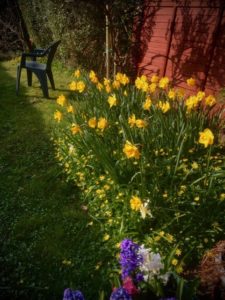
Oh dear, though, World War 3 erupted in the Ukraine. I described it as the first ‘post post-modern war’. Firstly, because it has no sense – even less than usual. Secondly, it is really a Civil war – these are the same people. Thirdly, it is partly being conducted through social media and there is a minute by minute account of its goings on – with all fake news and disinformation. Therefore: why? How? Echoes of Spain etc. in the 1930s. As Marx wrote, history repeats itself: the first time is tragedy, the second time is farce.
I catch up on some reading:

Lachman takes us though the history of Russia and the religious elements in its decisions:
https://www.youtube.com/watch?v=IAVZ3XsqIL4&t=3381s
He explains how Russia – around 800 – began in the Ukraine when the Pagan Slavs aligned themselves behind the Greek Orthodox Church and moved north to form Russia under Vladimir 1. The sense of religious mission – against a corrupt, liberal West – is then very much part of the plan, as well as all the military considerations (a place to control the Black Sea and site nuclear missiles). This is the first time Russia has not been an Empire and it is hurting – feeling it is not being respected. And Putin???!! Peter Gabriel’s Family Snapshot comes to mind:
https://www.youtube.com/watch?v=drYvkbPmGo8
This from a former Archbishop of Canterbury:
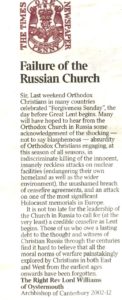
Time to brush up on my Kant and Perpetual Peace – something to be achieved through democracy.
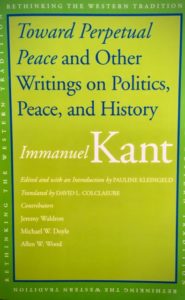
In the C18, he writes:
‘ One cannot conceive of international rights as a right to war (since this would be a presumptive right to determine what is right, not according to universally valid external laws that restrict the freedom of every individual but rather means of violence, according to one-sided maxims); one would have to mean by it that it is perfectly just that people who are so disposed annihilate each other and thereby find perpetual peace in the vast grave that covers all the horrors of violence together with their perpetuators’. (p. 81)
Anyway, it seems to be a long and painful process that is unfolding with no obvious end. I guess ‘the West’ took Russia for granted. Ironically, much of Putain’s modus operandi is shared by people like Johnson and Trump: autocratic rule, manipulation of elections, control of press, censorship – mass disinformation and control, banishing opposition. Just not quite as extreme – yet!!
Actually, quite a Bibliophilic month. I took possession of this superb facsimile of the Carfax Monographs by Kenneth and Steffi Grant.


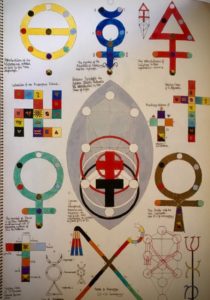
The Grants were into all things occult and esoteric, friends with the like of Aleister Crowley and Osman Spare. These Monographs are part of a publication of various occult philosophies and systems presented by the Grants. They are certainly visually sumptuous and set out many of the disciplines of the Golden Dawn.
On a not unrelated note, a major exhibition opened at the Tate in London on The Surrealists:
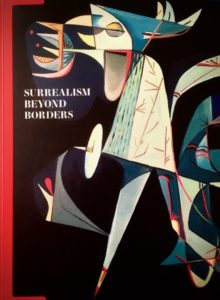
It is a funny title and I am not really sure they ‘existed’ as such. Caught between the Symbolists, The Blue Rider, Post-Impressionism, Cubism (pre World War I) and American Expressionism (post World War II), they are really quite a diverse group. I would not be the first to note that of the many artists included in the first 1936 Surrealist Exhibition in London, not many of them were actual Surrealists. Apparently, when Roland Penrose and Herbert Read went to invite Eileen Agar to exhibit her work at the show – the one where Salvadore Dali turned up in a divers outfit – she said, ‘I am not a surrealist’. They responded, ‘Well, you are now!’.
Certainly, there are even academic centres now for the study of surrealism. It is true that they were all heavily into what might now go under the banner of ‘neurotic realism’ – drawing on the sub and unconscious, dreams, hyper reality – not surprising that (especially with Freud not far behind) sexual and (with Golden Dawn around) occult imagery. Andre Breton – the de facto Director of the movement, embraced all these characteristics as well as pushing for its political dimensions in attacking bourgeois society – and also dropped them in his various manifestos. Once the horrors of the Holocaust and the Gulag became apparent, it rather took the wind out of their sails in terms of the ‘power of the mind’. Still, they remain influential, and a fascinating show.
Also, connected by association, I watched Meetings with Remarkable Men – a cinematic account of Gurdjieff’s Second Series. It is an odd film. All the actors have terribly English accents, and all those false beards! However, the movements are lovely and well presented by Jeanne de Salzmann. And, there are plenty of Gurdjieffian themes on offer: the futility of search, the need for discipline, discovering you are nothing, exceptional practice, guides, etc.
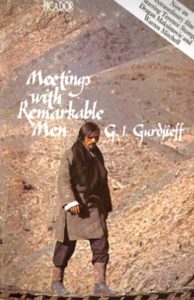
I never noticed before that in this photo, he is walking on a bridge = and I have known it for about 45 years.
Music of the month – two very different pieces:
The latest from Johnny Marr : some highlight Indie Rock – spirited and great tunes/ arrangement. Uplifting!±!
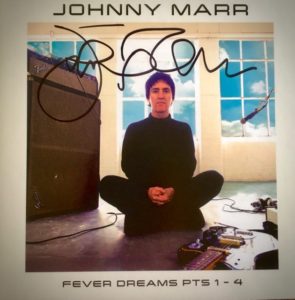
Then the Patitas by Bach played by a then very young Andras Schiff. Schiff is really my favourite player of Bach. He is not the most expressive or genuinely original interpreter. But, that purity of form and tone!! A nice atmosphere for forthcoming Easter meditations.
